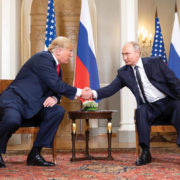Summit with Russian President Vladimir Putin in Helsinki prompts universal outrage for appearing to undermine U.S. Intelligence
Of the many controversies and political disputes of the Trump era, no issue has cast a shadow over this administration more than the issue of Russian collusion in the 2016 presidential election.
Russia — and its long-time president Vladimir Putin — remains a looming presence over the Trump presidency in a myriad of ways.
President Donald Trump’s perceived “obsession” with the former Soviet Union and its leader has generated scores of think pieces, memes and conspiracy theories as to how and why the president has been keeping a close tie with Putin and Russia, arguably the United States’s rival world power.
On Monday, July 16, Trump met with Putin face-to-face in a two-hour meeting Helsinki, Finland where Trump contradicted his own country’s intelligence agencies and said there is no definitive reason that would explain Russia’s meddling in the election.
“President Putin says it’s not Russia. I don’t see any reason why it would be,” Trump said when asked by reporters at the following news conference.
U.S. intelligence had confirmed that it found evidence that Russia had tampered with the 2016 election with against Democratic candidate Hillary Clinton using state-sanctioned cyber warfare and planting fake news stories on social media.
Trump’s suggestion that he sides with Putin on this matter sparked massive backlash at home from lawmakers and experts of all political leanings. U.S. House Speaker Paul Ryan — who has been criticized for not being tough on Trump — said that the president “must appreciate that Russia is not our ally.”
“There is no moral equivalence between the United States and Russia, which remains hostile to our most basic values and ideals,” Ryan said in a statement.
Sen. John McCain (R-Ariz.) also chimed in, saying in a statement, “No prior president has ever abased himself more abjectly before a tyrant.”
Senate Minority Leader Chuck Schumer (D-NY) unabashedly called Trump out in a tweet storm on Monday, saying, “For the president of the United States to side with President Putin against American law enforcement, American defense officials and American intelligence agencies is thoughtless, dangerous and weak. The president is putting himself over our country.”
Schumer also theorized that “millions of Americans will continue to wonder if the only possible explanation for this dangerous behavior is the possibility that President Putin holds damaging information over President Trump.”
Trump responded to the pushback by tweeting that he has “great confidence in my intelligence people” and that he recognizes “that in order to build a brighter future, we cannot exclusively focus on the past – as the world’s two largest nuclear powers, we must get along.”
However, Trump’s sidling toward Putin also adds another ripple on the Justice Department investigation — headed by special counsel Robert Mueller, former FBI director — over whether the Trump presidential campaign had anything to do with Russia’s reported tampering with the election.
In October 2016, a few weeks before the election, the U.S. government publicly confirmed that it was “confident” that Russia “directed the recent compromises of e-mails from U.S. persons and institutions, including from U.S. political organizations.”
A snowball effect ensued after it was revealed that several members of the Trump campaign had met or with Russian officials during the campaign, including a meeting at Trump Tower in New York City between Donald Trump, Jr., Jared Kushner and Paul Manafort and Russian officials. (Manafort has been indicted by Mueller, and Trump, Jr. said that the meeting was meant to discuss the adoptions of Russian children by Americans.)
As Mueller’s team adds more names to the list of indictments, Trump has not been shy in his denouncement of the investigation, frequently insisting that there is “no collusion” between the Trump campaign and the Russian government; he also has not agreed to be questioned by the investigation.
Just last week, the Justice Department indicted 12 Russians for hacking American emails, data from the Democratic National Committee and voter databases reportedly in order to help the Trump campaign.
Trump reportedly has also suggested shutting the investigation down, prompting Washington lawmakers to try to pass legislation that would prevent him doing so. U.S. Reps Eric Swalwell (D-Calif.) and Elijah Cummings (D-Md.) were among the first to introduce such a bill, the Protecting Our Democracy Act, which is supported by all Democrats and two Republicans in the House.
“If recent days’ shameful spectacles – the ridiculous [Peter] Strzok hearing, and the president’s refusal to confront Putin as the scheming antagonist he is – don’t convince more Republicans to put country over party and sign onto this bill, I truly don’t know what will,” Swalwell said in an op-ed in The Hill. “Meanwhile, as indictments pile up and hearings continue, we’ve seen many targets of the president’s vitriol stand before Congress, raise their right hands, swear their oaths, and tell what they know. President Trump must do the same with Mueller without further delay or obstruction. That’s how to help bring this sordid chapter in our nation’s history to a swift and just close.” (Klarize Medenilla/AJPress)






